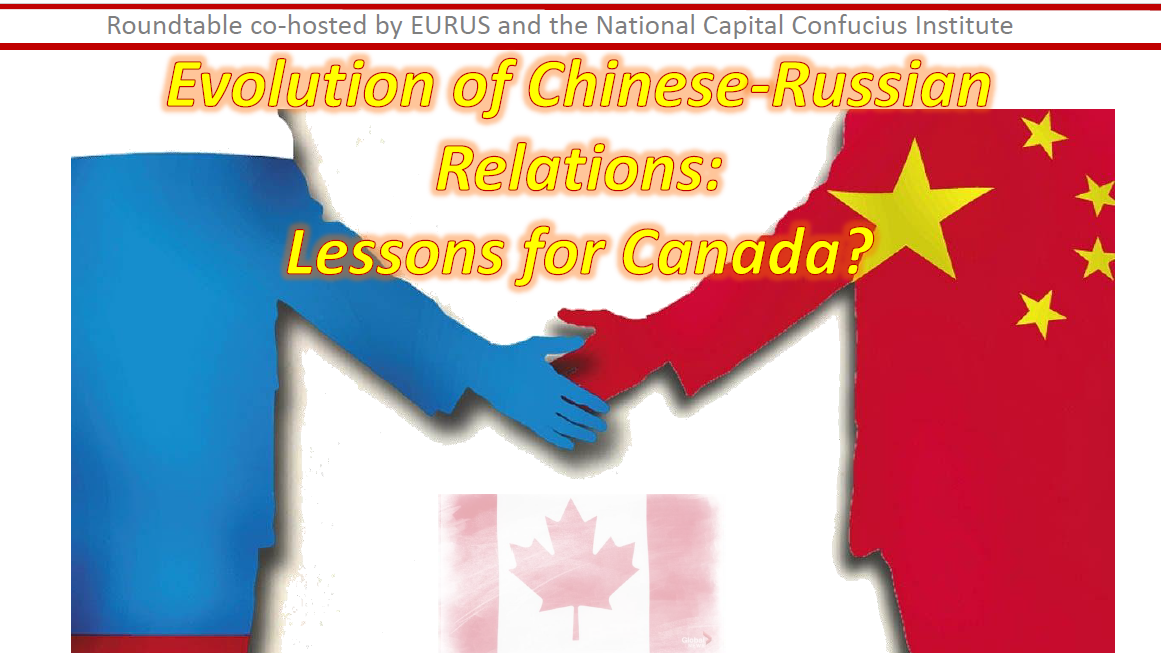Past Event! Note: this event has already taken place.
Evolution of Chinese-Russian Relations: Lessons for Canada?
April 5, 2018 at 10:00 AM to 12:30 PM
| Location: | 608 Senate Room Robertson Hall |
| Cost: | Free |
In cooperation with the National Capital Confucius Institute, the Institute of European, Russian and Eurasian Studies (EURUS) is pleased to co-host a roundtable, “Evolution of Chinese-Russian Relations: Potential Lessons for Canada?” on Thursday, April 5, at Carleton University.

About the event:
The strategic alignment between Russia and China has turned into something akin to an alliance but not being one, while macro-regional forms of alliance building intensified, notably in the format of the Shanghai Cooperation Organization (SCO) and the BRICS organization. The Eurasian Economic Union (EEU) sought initially to create a platform towards a prospective collaboration with the EU. However, it turned to be a platform for a closer relations with Chinese One Belt One Road initiative. Russia’s move towards closer partnership with China and expanding regional institutions (SCO and SCTO) is the most pragmatic and beneficial – albeit not without risks – strategic, long term choice. For China it secures natural resources, border stability and regional influence in China’s “strategic rear”.
About the speakers:
Pan, Xingming, Professor of History and Political Science, European and Russian Studies and Director, Center for European Studies at East China Normal University, Shanghai, China. Pan Xingming was majored in English Language and Literatures in his undergraduate studies, and received his MA and Ph.D in World History (Nanjing University). He was the visiting scholar at Grinnell College (Iowa) and Harvard University. Since 2008 he works at the School of Advanced International and Area Studies, East China Normal University. Currently his research is focused on: the historical perspective of the governance of Empires; Russia’s relations with other BRICS countries; China-Russia relations; Arctic studies. His recent publications include: “Values diplomacy and superposition of interests: the EU Strategy in Central Asia”, (2013); “Decolonization and transformation of European diplomacy”, (2012); “The European citizenship under the global context”, (2012); “An Important Pillar for Prosperity and Stability of Asia-Pacific: China’s perception and position on the Cooperation in the development of the Russia’s Siberia and Far East” (2013).
Maxim Braterskiy, Professor at the Department of International Relations, Higher School of Economics, Moscow, Russia. He graduated from the Leningrad (now St. Petersburg) University with a degree in Oriental Languages. In 1987 he joined the Institute of US and Canada Studies and received there a doctorate in History of International Relations. In 1993 – 2004 he worked at the Stanford University, School of Social Sciences and Humanities as Director of Stanford’s Moscow based Program. In 2004 he joined the Higher School of Economics and in 2005, he defended his Habilitation in International Relations. His most recent books include: “What is what in International Relations” (co-authored) Moscow, HSE, 2016 (in Russian), “Russia and China in Eurasian Integration” (co-authored), Moscow, 2015 (in Russian), “Economic Instruments of Russian Foreign Policy” (2012) (in Russian), “Economic Instruments of Foreign Policy & Political Risks”, Moscow, HSE. 2010 (in Russian). He also authored more than 70 academic articles and book chapters.
Comments by:
Jeremy Paltiel, Professor at the Department of Political Science, Carleton University.
Piotr Dutkiewicz, Professor at the Departments of Political Science/EURUS, Carleton University
Moderation by :
Justin Li, Director, National Capital Confucius Institute for Culture, Language and Business at Carleton University.
Piotr Dutkiewicz, Professor at the Departments of Political Science/EURUS, Carleton University
This event is free and open to the public. A light lunch will be provided for participants at 12:30PM